Salary Surveys
Visual Studio Magazine's 2012 .NET Developer Salary Survey
Our first annual salary survey shows that developers aren't just surviving, but thriving.
When we set out late last year to do our first-ever salary survey, we weren't sure what we'd find. The global economy continues to limp along, and unemployment in the United States remains stagnant. Layoffs are still a very real possibility for many, and employers remain hesitant to hire with future uncertainty. That's why our results were so encouraging: The survey reflects numerous positive trends for software developers, from job security to bonuses to the future outlook to job satisfaction. Yes, it's a good time to be a developer.
We polled software development professionals who subscribe to Visual Studio Magazine and related eNewsletters (.NET Insight and Redmond Developer News) in November 2011. More than 1,300 subscribers who currently work in the United States participated in the survey and filled out the online questionnaire. The median base salary was $92,000. On average, VSM Salary Survey respondents were college graduates with a four-year degree or higher level of education and more than a decade of industry experience.
The single-biggest survey takeaway is that 59 percent of respondents reported higher salaries in the last 12 months. More than half of those surveyed received bonuses during the same time period. The average reported base salary was $92,754, not including bonuses and additional compensation. More than one-third (38 percent) of survey respondents said their current annual base salaries, not including bonuses, fell into the six-figure range ($100,000 or more).
Bucking the Trend
Despite the gloomy global outlook, many Microsoft software development professionals appear to be bucking the "back to the future" trend.
"Microsoft software development gives us a strong future in the sense that there is some security in it," says Rafique S., who has worked as a software engineer and application developer for almost a decade at a manufacturing company (non-computer-related) outside of Los Angeles, Calif. "There is always going to be a demand for that type of skill and that type of work -- it's a good skill set to have," he says. "Our company has been stable and we're still hiring more people. We haven't had freezes or significant reductions. It's a little bit more conservative and the compensation that we're seeing has been about average for the last three or four years." That includes slight increases in salary and "token" bonuses around the holidays, which are based on corporate profitability.
Long tenures with the same employer may have helped some people ride out the economic rollercoaster in the technology sector. More than 43 percent of VSM Salary Survey respondents have been with their current employers for a decade or more -- 22.8 percent of that group have worked for the same organization for more than 15 years.
Survey respondents who worked for an independent software vendor (14 percent) reported the highest average salary, at $106,435. Those who worked for consulting firms, training companies and systems integrators also fell into the six-figure range on average at $103,635, not including bonuses and additional compensation. The majority of survey respondents, however, worked for corporate IT/IS (43.9 percent), with an average base of $95,015. Those employed by state and federal government, the education sector and non-profits (22.7 percent) earned less, reporting $78,688 on average. Average salaries might more closely reflect urban pay scales (see Average Salary by Location) because 65 percent of survey respondents worked in cities (200,000 to 500,000 residents) and major metropolitan areas (more than 500,000 residents).
Despite some job movement -- 16.2 percent have been with their current employer for one year or less and 4.5 percent have been laid off in the last 12 months -- by and large Visual Studio and .NET developers have skirted some of the harsher realities felt by stagnant or depressed job markets. But not everyone: while 59 percent received higher salaries in the last 12 months, 8.3 percent reported making less, based on budget cuts. Some government employees told us they experienced "5 percent cuts across the board," and federal employees are under a salary freeze mandated by Congress.
Growing Opportunity
Senior .NET developer Charles F. joined a new employer in 2011, making what he describes as a lateral move after the politics at his former employer -- a not-for-profit hospital -- became untenable. Charles, who has degrees in computer science and health-care administration, found work through a headhunter in about four days. He switched jobs and joined a private health-care management company in Kansas City, Kan., where he received a salary increase and opportunity for bonuses. "They're very generous here," he says. "It's a privately owned company and the people have been here for years -- five years is the shortest tenure besides myself."
That's notable, according to Charles, because in his experience .NET developers tend to move around a lot. "My primary challenge was that I worked at the same place for eight years, which is kind of long for a .NET developer, so my recent experience was very narrow," he says. "I'm very good at what I've been doing and the way I've been doing it, and I wanted to make good use of that specific skill set, which was C# and Visual Basic .NET development, but luckily I was able to find that pretty easily."
A Best Jobs in America 2011 survey published by CNNMoney, which was based on PayScale.com data, Bureau of Labor Statistics and Money magazine research (published in its November 2011 issue), paints a fast-growth job market. CNNMoney listed "Software Developer" as No. 1 for "Best Jobs for Fast Growth" in 2011, with median pay of $82,400 for those working at least two to seven years and top pay of $118,000. Total software developer jobs in the United States were estimated at 380,000 with the potential for 10-year job growth of 32 percent from 2008 to 2018, according to the CNNMoney report.
As job seekers sometimes find, however, "software developer" and related job titles don't always offer the best description of actual roles and their respective pay grades. Job descriptions for the same title can vary widely based on the employer and size of the organization, which is why we asked survey respondents to identify their primary role instead.
A little more than a quarter of those surveyed (27.4 percent) listed their primary job function as programming, software engineering or application development. Loosely translated, that describes the rank and file Visual Studio developer who is actually working with code. Not surprisingly, the coders ranked on the lower end of the pay scale in terms of average base salaries: programmer/analyst ($75,114) and software engineer/application developer ($85,165).
Average salaries jumped dramatically when "senior" status was achieved. Almost 20 percent of respondents said their primary role was senior software engineer/senior developer. This group reported a six-figure average base salary ($100,655).
Senior software engineers and developers earned more on average than team leaders and IT managers. The 6.5 percent who described their job as development manager/team lead earned $94,664 on average. The 9.4 percent of respondents who classified their primary function as IT management reported an average base salary of $98,975.
Only 4.2 percent of survey respondents categorized their role as database administrator/developer. However, 67.5 percent of 1,104 respondents reported a background -- they had worked on a project for at least six months -- in database development: 45.3 percent in database administration and 24.2 percent in data warehousing. The average base salary for database administrator/developer was $91,276.
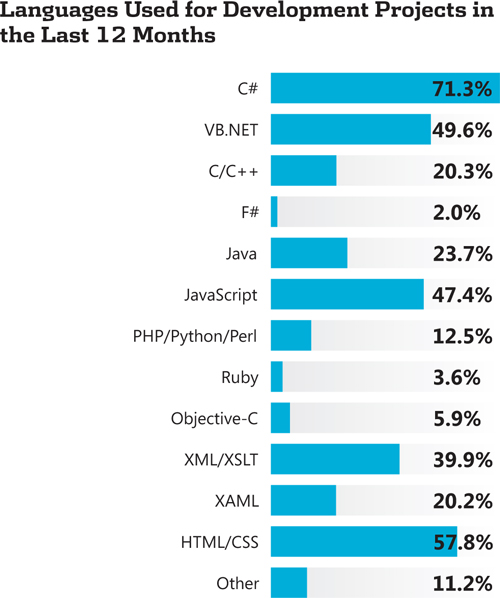 |
Not surprisingly, VSM Salary Survey respondents who characterized their role as software architect (11.5 percent), which traditionally implies higher education and a lot more training, earned on average $116,119. Only 1.4 percent of those surveyed listed their primary role as Research and Development (R&D), although 27.4 percent claimed to have a background in R&D (in other words, worked on a project for at least six months). The average base salary of those who listed R&D as their primary job function was $113,171. Chief information officers accounted for 2 percent of respond¬ents and reported an average salary of $118,804.
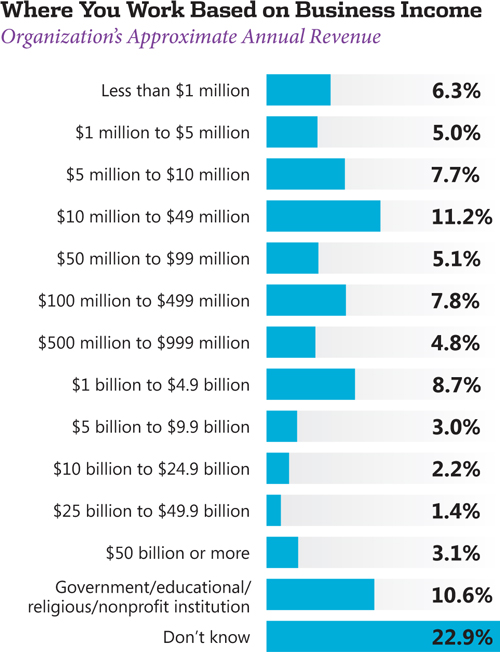 |
Several people indicated that they wear too many hats to pick a primary job function. One Microsoft software professional worked as a system engineer and a Web/application developer, while another classified his job description as IT management, software development and DBA. "[I] hold several roles," commented another respondent: "LAN admin, network support and trainer, and database developer."
At the same time, 57.9 percent of survey respondents reported working standard hours -- between 40 and 45 hours per week -- for their employers.
Additional Compensation
Raises, bonuses and compensation packages -- including paid training (40.1 percent) -- are still the norm at many organizations, according to survey participants. Close to 70 percent (67.2) of those surveyed still received 401(k) retirement options with matching contributions, 50.1 percent reported paid medical/dental and 48.7 percent were eligible for paid life insurance. More than 90 percent received two weeks of paid vacation or more. Paid training and technical conferences, however, were at the top of list for compensation benefits that were cut in the last 12 months, according to survey respondents.
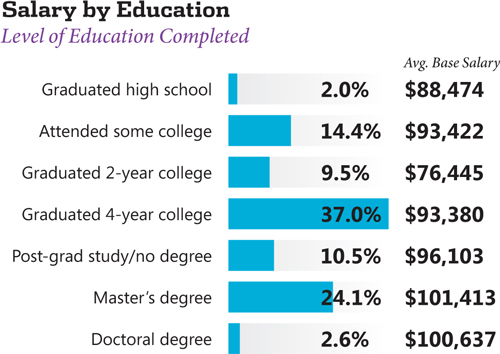 |
In the last 12 months, 10 percent of 1,022 respondents received increases in salary of $10,000 or more, 9.6 percent saw raises of $5,000 to $9,999, and 42.1 percent received $4,999 or less. Salary increases were generally based on cost-of-living raises, merit increases, profit distribution, job changes in the last year, incentives to stay at the company and tokens of good will.
Many people were cautiously optimistic about salary increases in the next 12 months, with 48.3 percent expecting raises of $4,999 or less, 9.9 percent expecting $5,000 to $9,999 and 7.1 percent anticipating $10,000 or more. About one-third (33.2 percent) expected no increase in base salary. This comment from a respondent summed it up: "There is a salary freeze and I do not anticipate any changes (which is fine with me ... I'm employed)."
Only 1.5 percent expected to see a decrease in salary. However, 5.1 percent indicated that they anticipated layoffs would affect their compensation in the coming year.
More than half of those surveyed (52.9 percent) indicated some involvement in the decisions related to their department's IT budget when it comes to spending -- and cuts. Of that group, 22.1 percent described their role as influential decision makers, and 8.1 percent said they make the final decision. Close to 70 percent indicated that their IT budgets in 2011 either increased (29.9 percent) or stayed the same (39 percent) compared to 2010. About a third (31.1 percent) faced budget cuts. Out of 932 respondents, 40.7 percent expected their company to hire additional software developers in the next 12 months.
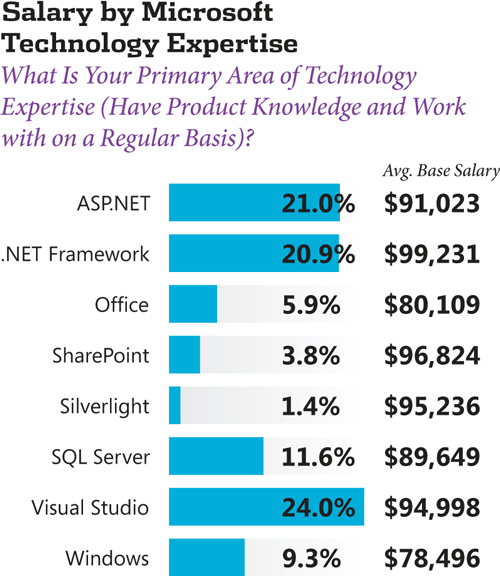 |
Temp to Perm
Have organizations resorted to using more contract workers in this tough economic climate in the last 12 months? Approximately one-third (34.7 percent) of those surveyed said yes. Of this group, 3.6 percent said they had lost a job due to outsourcing. And 8.4 percent fear losing their jobs to outsourcing/contractors in 2012, while 88.6 percent indicated that their organizations' use of outsourcing/contractors would have no impact on their role. About 3 percent expected to find employment with an outsourcing provider.
Martin D. has worked on 10 projects in the last two years as a contractor through a Texas-based firm, earning in the $95,000 to $99,000 range without benefits. In the last few years, a number of projects were killed based on budget restrictions while others were put on hold (until 2012) because they were waiting to get funding.
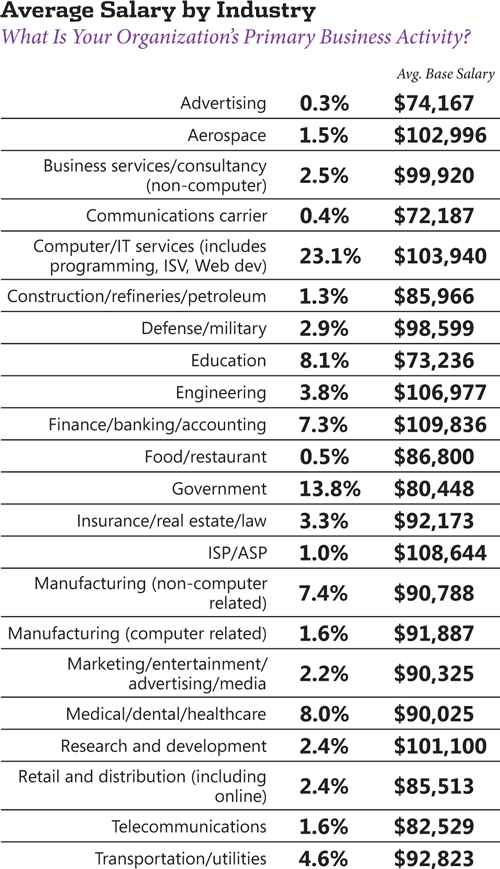 |
He recently filed a software patent application for a mobile company in the Boston area, which as a full-time hire would have resulted in a bonus, he says; as a contractor, he didn't qualify for additional compensation. A generalist who has 30 years of development experience and "done everything from soup to nuts," Martin says he has worked in Visual C#, Visual C++, Mono, Eclipse and to a limited extent Xcode. He's actively looking for full-time work and expects the job outlook to pick up in 2012. "I see a lot more things coming available; a lot more headhunters are getting in touch with me," says Martin, who worries that his lack of management experience could limit his earning potential. "One thing that I have avoided is management, which kind of puts a ceiling at a lot of places," he says.
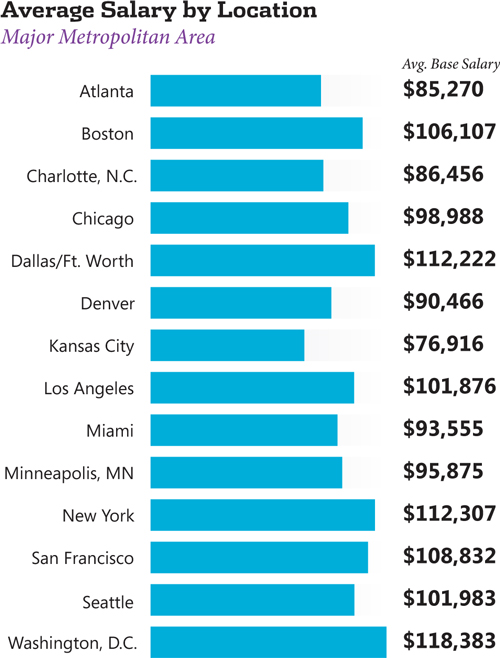 |
Career Satisfaction and 5-Year Outlook
Fewer than 5 percent of survey respondents were laid off in the last 12 months. That stat may be misleading, though, as people without gainful employment are generally not filling out salary surveys. Of the survey respondents who were laid off and rehired, 54.6 percent said they found a new job in one month or less, and 89.4 percent found employment in four to six months or less.
More than three-quarters (77.4 percent) of respondents reported general satisfaction with the Microsoft development profession. Of that group, 30.3 percent love it and wouldn't want to do anything else. Almost 20 percent (19.8) said they were neutral and happy to be working, but they'd rather do something else (see "Visual Studio and .NET: 5-Year Outlook"). Despite adequate compensation, Rafique S. says that he feels neutral about his in-house development job because it's somewhat limiting and doesn't take full advantage of his experience and capabilities.
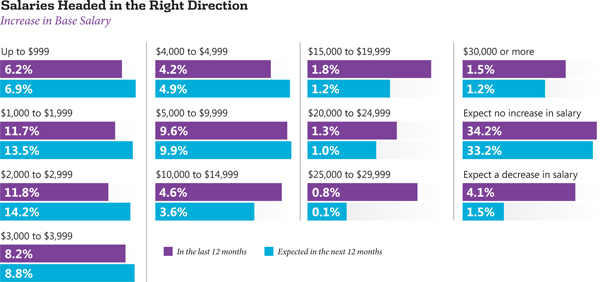 |
What technologies did respondents rate highest for job security and retention? Visual Studio and .NET ranked first (84.9 percent), followed by SQL Server (71.1 percent), ASP.NET (55.4 percent) and HTML/JavaScript (48.6 percent). Windows and SharePoint were virtually tied with 34.4 percent and 33.4 percent respectively, followed by Office (28 percent), Windows Azure/SQL Azure (11.7 percent) and Silverlight for Windows Phone (9.2 percent). Several people cited general mobile and cloud development as keys to job security.
"Basically, keeping up on technology is the best thing," says Martin D. "Being able to pick things up quickly is also very useful. When I started at a company a few years ago, I didn't know Java but I said I could learn it and they said, 'We would be happy to do that.'"
One survey respondent thought more-specialized technologies was the best strategy for job retention. ".NET is no longer considered to be a specialized technology since the majority of the people work with this technology and it's easy to find a replacement," he commented.
Another survey respondent stressed broad skillsets and flexibility: "Adaptation -- being able to do every IT job." Several people felt that there was no such thing as job security. "None -- everything is subject to cost cutting and layoffs," lamented one survey respondent. "Nothing can be counted on at my company," noted another.
In terms of top job functions for security and retention, database administrator/developer ranked highest (46.5 percent), followed by senior engineer/senior software developer (43.5 percent) and software architect (43 percent). Software engineer/application developer (39.3 percent) and programmer/analyst (38.9 percent) were also viewed as good bets, followed by software designer (33.6 percent) and Web services architect/developer (33.3 percent) and mobile developer (25.6 percent).
How Does Your Salary Rank?
Most people assume that their industry peers are better compensated, and that trend holds true for roughly half of the software development professionals who participated in our survey. Only 20.8 percent believed that their salary or gross compensation was higher compared to others in the same field; 45.6 percent thought they earned less, and 33.5 percent saw their salaries as comparable to their peers.
Although the majority of those surveyed (77.4 percent) are generally satisfied with Microsoft development as a career choice, 13.2 percent anticipate their compensation will change in the next 12 months because they plan to switch employers. Even so, the outlook for 2012 is generally positive, with 59.9 percent expecting salary increases and 50.2 percent anticipating bonuses this year.